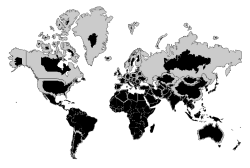
If we go back in time, our ancestors formed societies so we stop killing each other over food and start using the talents of the weak members for benefit of society. By doing so we stopped useless, resource-squandering wars and shifted our focus to increasing well-being and prosperity in society.
The EU has started to live as a project for peace between European countries that were in constant wars with each other, but now it is turning into a social unrest project as its members refuse to integrate fully. The UK has already left the group and is not part of the club! This was the second awakening call for the EU after Greece’s financial crisis, which would turn into it leaving the union if it were not bailed out. The EU is a combined 27 countries, with a population of 450M, the third most populated country in the world, and the second biggest country by GDP. Each of these 27 members, like human beings, has its unique economic characteristics. Some work hard and save money to buy things while some are lazy at work, prefer to spend their time and money on leisure, and use debt to finance their needs. I like to mention these differences to magnify the point that, while we accept the difference between members of a family and share a dinner table with them, it seems like the EU fails to as they draw lines and try to limit their interaction with other members, reducing their exposure to possible risks opposed by them.
1. Governance and fiscal policy disconnect
The financial crisis in Greece was a live demonstration of how the political and fiscal policy disconnect can inflame protests, unrest, unemployment and economical uncertainty. The reliance of Greece on the ECB to provide liquidity hindered it from easing, even at expense of inflation, causing mayhem in the Greek bond market. This fiasco was ended by other members stepping in and bailing Greece out while demanding major structural change in the country. These bailouts even become a subject of discussion with some politicians accusing states like Germany and France of buying cheap Greek bonds in order to benefit from them when they mature at face value.
2. Democracy limitation
International politics is not democratic and is in a state of extortion and intimidation. The United Nation was formed to overcome these issues, but because of the conflict of interest between its members and lack of enforcing enforcing power, it is politely ignored. In contrast, the EU gives its members power of negotiation and international political influence that its members cannot obtain individually. It also facilitates overruling harming legislation introduced by its members.
The EU is ridiculously complex. The European counsel is made of heads of States, the counsel of the EU with ministers of the states, the EU commission with executives of the European Union for each member, the European parliament and the EU court of justice. From all the mentioned, only the EU parliament is elected by the citizens, and members of other institutions are elected by indirect votes. The problem with the system is that while parliament has become more powerful in the past decades, it still cannot introduce new laws on its own, a core flaw in a democratic system that empowers member states.
3. Immigration policy failure
The war in Syria caused a biblical exodus to central Europe, which at some point forced Germany to open its door to over 800 thousand Syrian asylum seekers.
In 1995 the Schengen area got opened, and it got rid of border checks between some EU members. this was a benefit for those EU citizens who wanted to travel or work in other countries other than theirs, but it also facilitated the movement of irregular immigrants.
According to the Dublin convention, Irregular migrants are the responsibility of the countries they first arrived in, leaving some at the border and economically troubled members in financial constraints. In retaliation, these members let the immigrant pass their soil without registering them and letting the northern rich members take care of them. This is more like behavior that we can see amongst the members of a family without visionary members and sets of unproductive rules.
All in or All out, and no but
When I tell people that Switzerland is not part of the European Union but it is part of a trade unity with the Union, many of them struggle to believe. when we talk about the United States of America, we even don’t bother to think that it is comprised of 50 countries, united to form a state. They have no borders, no border patrol. They have a Government in Washington that they directly vote for, and they even use the same currency. Compare this to the EU where its some states hesitate to adopt the Currency, terminate border checks that weaken the meaning of unity.
The EU is hesitating to deal with these problems by procrastinating them while they need a fast resolution if they want to keep other members in, like Italy which is the next nominee to leave. The probable solution will be to bind members by fully integrating them into the system.






